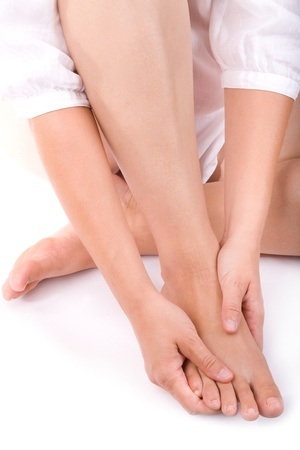Psoriasis and Your Feet
Many of us remember the old advertisement that talked about “the heartbreak of psoriasis,” but do you know what psoriasis actually is, or how it can affect your foot health?
What is Psoriasis?
Psoriasis is a chronic illness of the autoimmune system that affects as many as 7.5 million Americans. The most common type of psoriasis causes plaques — red, raised patches on the skin that are covered by a scaly, silvery layer of dead skin. These plaques are most commonly found on the elbows and knees, but they can also occur on the feet. When they do, they are particularly itchy and uncomfortable. A more severe rare form of podiatric psoriasis is called palmoplantar pustulosis. Psoriasis symptoms on the feet include dry, cracked, irritated skin and — in the case of palmoplantar pustulosis — pus-filled blisters.
Am I at Risk?
Psoriasis affects more women than men and is more commonly seen in adults than in children. About 10 percent of people are born with genes that could cause psoriasis, but only about 2 percent of people actually get it.
What If I Think I Have Psoriasis?
Call your podiatrist immediately if you notice symptoms of plaque psoriasis or palmoplantar pustulosis on your feet. Your foot doctor will examine your feet and diagnose the issue. If it is psoriasis, medical intervention will be appropriate and necessary. Common treatments include over the counter and prescription topical steroids, prescription oral medications, vitamin A and vitamin D ointments to slow down skin cell growth, and regular ultraviolet light therapy.
If you receive a psoriasis diagnosis, there are several ways to manage your condition:
- Take good care of your feet. Injury is known to trigger psoriasis outbreaks. Avoid potentially dangerous activities.
- Wear comfortable shoes and socks made of leather, wool, cotton, and other materials that allow feet to breathe.
- Stop smoking. Smoking is a psoriasis trigger, and is terrible for your overall health and wellbeing.
- Limit alcohol intake. Studies indicate that alcohol consumption may aggravate your psoriasis.
Try this at-home routine weekly to keep the skin on your feet looking and feeling great, and minimize psoriasis outbreaks:
- Soak your feet in warm water and pat them dry with a clean, soft towel.
- Slather feet with an effective moisturizer, then cover them with cotton socks for a few hours or overnight.
Podiatric psoriasis and palmoplantar pustulosis are uncomfortable and can make everyday activities difficult. James M. McKee, DPM, FACFAS has solutions to your problem. Call Podiatry Group of Annapolis, P.A. at 410-224-4448 or click here to schedule an appointment in our comfortable and convenient office on Solomons Island Road in Annapolis, MD. Dr. James M. McKee will carefully examine your feet, diagnose your issue, and work with you to create an individualized and effective treatment plan.

